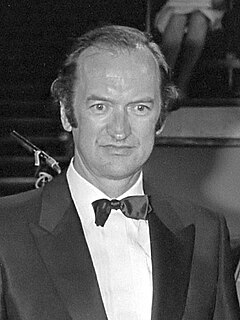Leonhardt-Consort, also known as the Leonhardt Baroque Ensemble, was a group of instrumentalists which its director, the keyboard player Gustav Leonhardt founded in 1955 to play baroque music. The Consort was active until around 1990, although some members including Leonhardt himself continued to perform after that date.

Gustav Leonhardt was a Dutch keyboard player, conductor, musicologist, teacher and editor. He was a leading figure in the movement to perform music on period instruments. Leonhardt professionally played many instruments, including the harpsichord, pipe organ, claviorganum, clavichord, fortepiano and piano. He also conducted orchestras and choruses.

Baroque music is a period or style of Western art music composed from approximately 1600 to 1750. This era followed the Renaissance music era, and was followed in turn by the Classical era. Baroque music forms a major portion of the "classical music" canon, and is now widely studied, performed, and listened to. Key composers of the Baroque era include Johann Sebastian Bach, Antonio Vivaldi, George Frideric Handel, Claudio Monteverdi, Domenico Scarlatti, Alessandro Scarlatti, Henry Purcell, Georg Philipp Telemann, Jean-Baptiste Lully, Jean-Philippe Rameau, Marc-Antoine Charpentier, Arcangelo Corelli, Tomaso Albinoni, François Couperin, Giuseppe Tartini, Heinrich Schütz, Giovanni Battista Pergolesi, Dieterich Buxtehude, and Johann Pachelbel.
Contents
The ensemble was based in the Netherlands, although it included people whom Leonhardt knew from Vienna, where he taught at the Academy of Music at the beginning of the 1950s. When it was founded the ensemble consisted of Leonhardt, his wife Marie (a violinist) and other string players. [1] It expanded to include wind players such as Frans Brüggen. [2] From early in the ensemble's history they collaborated with singers such as the counter-tenor Alfred Deller.

The University of Music and Performing Arts Vienna is an Austrian university located in Vienna, established in 1817.

Franciscus ("Frans") Jozef Brüggen was a Dutch conductor, recorder player and baroque flautist.

Alfred George Deller, CBE, was an English singer and one of the main figures in popularising the return of the countertenor voice in Renaissance and Baroque music during the 20th century.
The music of Johann Sebastian Bach was central to the work of Leonhardt and his ensemble. In collaboration with the Concentus Musicus Wien, conducted by Nikolaus Harnoncourt, they recorded from 1971 to 1990 a complete set of Bach cantatas in historically informed performances, the Teldec set. The ensemble participated in Bach's St Matthew Passion with the Groningse Bachvereniging, conducted by Johan van der Meer. They recorded all his harpsichord concertos and the Brandenburg Concertos. They also recorded works by William Lawes and Henry Purcell. [3]

Johann Sebastian Bach was a German composer and musician of the Baroque period. He is known for instrumental compositions such as the Art of Fugue, the Brandenburg Concertos, and the Goldberg Variations as well as for vocal music such as the St Matthew Passion and the Mass in B minor. Since the 19th-century Bach Revival he has been generally regarded as one of the greatest composers of all time.
Concentus Musicus Wien (CMW) is an Austrian baroque music ensemble based in Vienna. The CMW is recognized as a progenitor of the period-instrument performance movement.

Nikolaus Harnoncourt was an Austrian conductor, particularly known for his historically informed performances of music from the Classical era and earlier. Starting out as a classical cellist, he founded his own period instrument ensemble, Concentus Musicus Wien, in the 1950s, and became a pioneer of the Early Music movement. Around 1970, Harnoncourt started to conduct opera and concert performances, soon leading renowned international symphony orchestras, and appearing at leading concert halls, operatic venues and festivals. His repertoire then widened to include composers of the 19th and 20th centuries. In 2001 and 2003, he conducted the Vienna New Year's Concert. Harnoncourt was also the author of several books, mostly on subjects of performance history and musical aesthetics.





